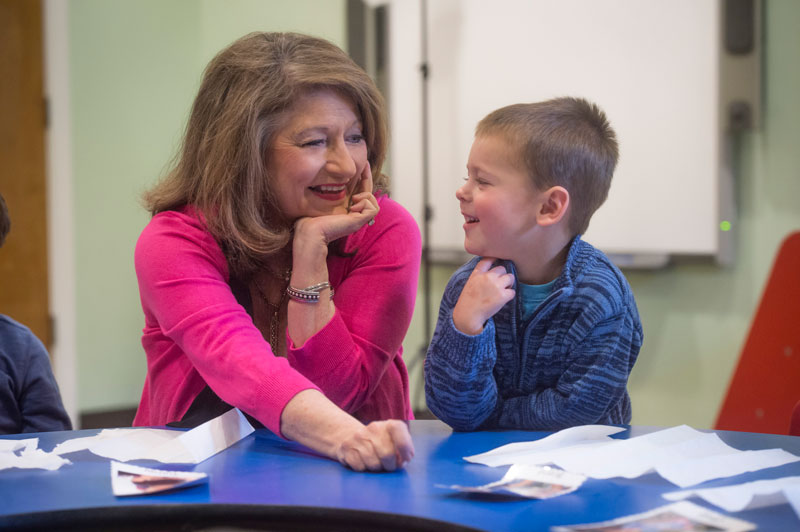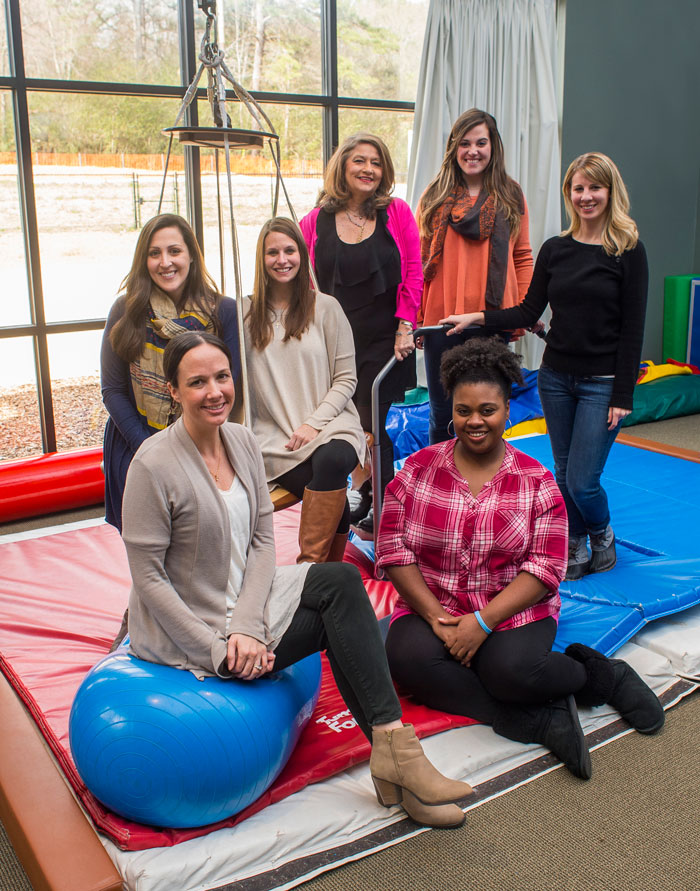Young children with developmental delays or disabilities often rely on a team of professionals to teach them to walk, talk, read, write, or conduct other daily tasks. But often, the members of those teams—early intervention and early childhood special education teachers, physical and occupational therapists, and speech-language pathologists—don’t learn to rely on each other until they are on the job.
Jennifer Kilgo, Ed.D., used to ask herself this question: If they have to work as a team, why not learn as a team? She answered it by developing Project TransTeam, a graduate program that brings together UAB School of Education early childhood special education students with UAB School of Health Professions physical and occupational therapy students. As a group, they discover the power of collaboration and gain the skills to build connections between disciplines.
Crucial Years
Teamwork is crucial for effective early intervention and education for young children with delays or disabilities, says Kilgo, UAB professor of early childhood special education. “The first five years are fundamentally important to each child’s future development, learning, and success,” she explains. “To assist children and families, we can offer specialized interventions, adaptations, equipment, technology, or other types of assistance, for example. Often we can prevent further delays and help the children catch up and improve their outcomes in areas such as social competence, learning achievement, and inclusion in natural environments within the community. We also can help families know what to expect and how to support their children and foster development and learning.”
Launched 16 years ago, Project TransTeam has received several U.S. Department of Education grants. The latest, totaling $1.25 million, will support 70 scholarships over five years along with training and research, and boost the number of professionals “who know how to serve as effective team members for children in birth-to-three, preschool, and early childhood special education programs,” Kilgo says. UAB is one of only six universities to receive the new grant.
 (Above and top) Jennifer Kilgo shares smiles with young children at Mitchell's Place.
(Above and top) Jennifer Kilgo shares smiles with young children at Mitchell's Place.
Building Consensus
Communication is key in setting priorities for a child’s Individualized Education Program, which outlines measurable objectives, says Andi Gillen, a 2004 Project TransTeam graduate. Now director of the University of Alabama’s RISE Center, which serves children with developmental delays and disabilities, she says the UAB curriculum taught her to build consensus.
“When we work with young children, we must consider the families’ priorities,” says Gillen. “We also have evaluations by physical therapists, occupational therapists, speech-language therapists, and the teacher. Then we may have a medical doctor, nurse, or grandparent involved. Many people are part of the decision-making process. In addition, we deal with emotional matters—such as children who may be medically fragile, or who could have severe issues and not make progress as quickly as the team or family thought they would. There’s a lot of pressure. We’re influencing the life of that child and family.
“Through Project TransTeam, I learned how to set up meetings so that they are purposeful and follow a direction,” she says. “The priority is for the team to come together and for everyone to listen and have mutual respect for one another.”
Real-Life Situations
During the program’s first semester, “the big focus is learning about each other’s professions,” says adjunct faculty member Billy Ronilo, a physical therapist working with the Alabama Department of Rehabilitation Services and one of Project TransTeam’s first graduates in 2001. “The physical therapy, occupational therapy, and special education students discuss and explain their roles.”
The faculty, which includes occupational therapy professor Laura Vogtle, Ph.D., and early childhood education professor emeritus Jerry Aldridge, Ed.D., also organizes presentations and panel discussions featuring local teachers, therapists, and caregivers who share their experiences and offer advice. “It’s important for students to hear about successes and roadblocks from community teams,” Ronilo says.
 Kilgo (back row, center) meets with alumni and students working at Mitchell's Place: (front row, from left) Nicole Mishkin and Iyanna Cammack; (back row, from left) Samantha Pate, Bry Davis, and students Ashton Rickard and Carri Haywood.
Kilgo (back row, center) meets with alumni and students working at Mitchell's Place: (front row, from left) Nicole Mishkin and Iyanna Cammack; (back row, from left) Samantha Pate, Bry Davis, and students Ashton Rickard and Carri Haywood.Later, students divide into teams that include representatives from the different professions. Together, they discuss a case study and develop a course of action for the child in the case. “We try to give them as much of a real-life situation as possible,” Ronilo says. “It’s helpful for understanding the nature of providing services for children and for realizing the important roles of the parent, grandparent, neighbor, older brother or sister, or day-care provider in order to have successful care and outcomes.”
Network of Knowledge
Columbus, Ga., native Carri Muders Haywood, a current Project TransTeam student, enrolled in the program while working as a behavior therapist at Mitchell’s Place, a Birmingham center serving children with autism spectrum disorder and other developmental disabilities. “A large group of Mitchell’s Place teachers have gone through the program, so it was an easy choice,” she says.
“I have many questions for the other disciplines, and I’m excited to get to know their point of view,” she says. “It will be nice to have a network of professionals whom I can turn to and reference. It’s a good resource for my career.”
Aliceville, Ala., native Jake Craft, an early childhood special education teacher at Jefferson County’s Burkett Center for children with disabilities, graduated in 2013. He knows the impact of early intervention programs firsthand, having attended them as a child after a diagnosis of cerebral palsy. But Project TransTeam expanded his knowledge beyond his own experience and his special education training.
“I learned different ways of helping a child meet a goal and about equipment and adaptive materials used by physical and occupational therapists,” Craft says. “Our different methods and research-based techniques are interrelated, and it’s beneficial to have them in mind in the field.”
After students like Haywood and Craft graduate, the faculty continues to offer advice and help them find jobs, Kilgo says. Alumni also can attend Project TransTeam seminars. “Early childhood special education is a demanding field,” she says. “So we have a multitude of ways to provide ongoing support.”
Diverse Challenges
Students also learn to work and communicate with children and families from different cultures and socioeconomic backgrounds, Kilgo says. She explains that those who work in early intervention and early childhood special education must be prepared to handle situations such as when a child’s parent cannot provide money for a field trip, or when a caregiver working the night shift is unable to attend parents’ night. Teams may also face cultural dilemmas—perhaps a father from a male-dominated culture who is uncomfortable talking with female teachers, or a family with religious beliefs that cause them to refuse certain medical treatments for their child.
“How do we address such issues?” asks Kilgo. “We teach our students problem-solving and how to use community resources to address those situations.”
Kilgo also wants to increase the numbers of professionals from underrepresented groups, including minorities, men, and individuals with disabilities. The new grant will help her launch an aggressive recruitment and retention effort.
“There are shortages of personnel representing diverse backgrounds in early intervention and early childhood special education,” she says. “The goal is for our scholars to include a diverse population that is representative of the children we serve.”
• Discover the academic opportunities available in the UAB School of Education and UAB School of Health Professions.


